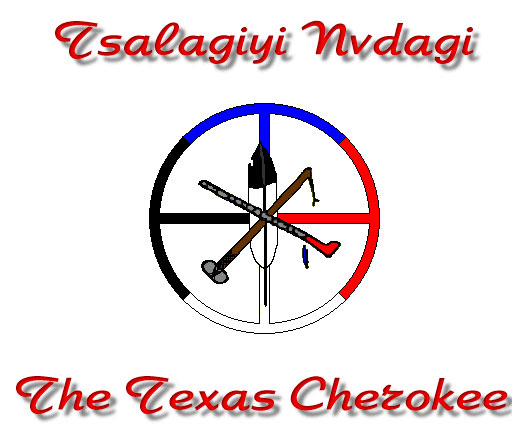
By Chief D. L. Utsidihi Hicks
![]()
| Vowel Sounds | Consonant Sounds |
| a, as a in father, or short as in rival. e, as a in hate, or short as in pat. i, as i in qique, or short as in pit. o, as o in note, approaching aw in law. u, as oo in food, or short as u in pull. v, as u in but, nasalized and leaning to un sound. |
g as in English, but sometimes approaching k. d as in English, but sometimes approaching t. h, k, l, m, n, q, s, t, w, y, as in English. Syllables following g, except for ga, sometimes sound like k. Go, du, and dv, sometimes sound as to, tu, tv. Qu approaching kw, as kwa for qua, kwoo for quo, kwee for qui, and so on. Ts approaches js or j. Syllables following tl, sometimes vary to dl. |
![]()
![]()
![]()
![]()
![]()
A quick note from the web author, Chiromara:
I thought it might be appropriate to begin with a small list of greetings and farewells.
| Osiyu (aw-see-yoo) Way the old people said “Hello.” It also meant “Good.” |
Siyu (see-yoo) Hello. |
Siyu Dohitsu (see-yoo taw-hee-jsoo) Hello. Are you well? |
| Dohiquu (taw-hee-koo) I am well. |
Osda (aw-s-da) Very good |
Tlaosda (tla-aw-s-da) Not so good. |
| Nahinahv (na-hee-na-hv) And you? |
Hitsalagi (hee-jsa-la-gee) Are you Tsalagi? |
Geyi (gay-yee) “I go” or “Goodbye.” |
| Hilahi (hee-la-hee) Go then. |
Donvdagohvi (daw-nv-da-go-hv-ee) Until we meet again. |
![]()
![]()
![]()
![]()
![]()
The following is arranged with the Tsalagi “Cherokee” word or phrase first
Phonetic pronunciation second
English translation third
| Ugodi (oo-gaw-dee) A lot. |
Ilvtlv (ee-lv-tlv) About |
Galvlati (ga-lv-la-tee) Above, the sky, on high. |
| Ayoigvneti (a-yaw-ee-gv-nay-tee) Abuse. |
Vtli (v-tlee) Across. |
Guhisdiha (goo-hee-s-dee-ha) Accuse. |
| Gule (goo-lay) Acorn. (Same in Oklahoma dialect.) |
Utana (oo-ta-na) “Adult”; “big”; “tail” |
Deganudasti (day-ga-noo-da-s-tee) Adz, sti indicates sharp. |
| Daskasti (da-s-ka-s-tee) Afraid |
Oni (aw-nee) After. |
Talinei (ta-lee-nay-ee) Again, or “second in number,” or “do it again.” |
| Adalihelitsedi (a-da-lee-hay-lee-say-dee) Age, appreciate. |
Agavli (a-ga-v-lee) Aged, old. |
Uwata (oo-wa-ta) Aged, old. |
| Unole (oo-naw-lay) Air. (Same in Oklahoma dialect.) |
Tsulegilanunayi (jsool-kee-la-noo-nay-yee) Alighted, for “he alighted there.” |
Gvna (gv-na) Alive. |
| Owasa (aw-wa-sa) All |
Howa (haw-wa) All right or okay. |
Ani-Tsalagi (a-nee-jsa-la-gee) All the people. |
| Tsulasgi (jsoo-la-s-kee) Alligator. |
Ale (a-lay) “Almost” and “or” (Same in Oklahoma dialect.) |
Uhisata (oo-hee-sa-ta) Alone, or lone. |
| Anadanakalagisgi (a-na-da-na-ka-la-gee-s-kee) Alum, wild, “it removes things from the gums,” a plant. |
Gayula (ga-yoo-la) Already. |
Squu (s-kwoo) Also |
| Ganuseda (ga-noo-say-da) Ambassador |
Vdiskalunagi (v-dee-s-ka-loo-na-gee) Ambush, for “hiding out place.” Ahuluna (a-ha-loo-na) modern form. |
Tsunigayvli Iyulestanv (tsoo-nee-ga-yv-lee ee-yoo-lay-s-ta-nv) Ancestor. |
| Anitsunigayvli Iyulestanv (a-nee-tsoo-nee-ga-yv-lee ee-yoo-lay-s-ta-nv) Ancestors |
Agayvlige (a-ga-yv-lee-gay) Ancient. |
Eti (a-tee) Ancient. |
| Dolvtsa (daw-lv-ja) Basket. |
Tagu (ta-goo) Beans (a food stuff) {Also game played in kala} To play this game, the players were divided into two teams of equal number. 6 half-beans, 24 corn kernel counters, and a basket about 18″ square and 2 1/2″ deep were required. The six half beans were placed in the basket and flipped in the air to be caught. Only three combinations of how the beans landed were counted. All flat sides counted as 6 points, all round sides were counted as 4 points, and a single side of round or flat and 5 opposite counted as 2 points. The game started with all counters in a neutral pot. The game ended when one team got the largest number of counters. |
Yvsv (yv-sv) Bison or buffalo. |
| Gagaluni (ga-ga-loo-nee) “Boney” or Hungry Time. |
Gvnasa (gv-na-sa) Broom. |
Ayeli Gadugi (a-ya-lee ga-doo-gee) Central Towns. |
| Tsalagiyi Nvdagi (jsa-la-gee-yee nv-da-gee) Cherokee in Texas |
Unolvtanvi (oo-naw-lv-ta-nv-ee) Cold time. |
Sogani (saw-ga-nee) Coneflower |
| Selu (say-loo) Corn |
Vlasgita (v-la-s-gee-ta) Dance or dancing. |
Anaulasgisgu (a-na-ool-s-gee-goo) Dance where everyone participated. “They are dancing.” |
| Dagesi dinvsati (da-gay-see dee-nv-sa-tee) Dance rattles. “Tortoise, puts on legs.” |
Galoni (gay-loo-nee) End of Fruit Time. |
Ulagahasti (oo-la-ga-ha-s-tee) Fall season. |
| Astayidistiyi (a-s-ta-yee-dee-s-tee-yee) Faster and harder, or dancing. |
Ayastigi (a-ya-s-tee-gee) Fighting Man, or Warrrior. |
Aniyastigi (a-nee-ya-jee-gee) Fighting men or warriors, and Warrior Society. |
| Atsila (a-jsee-la) Fire. |
Atsilasvti (a-jsee-la-sv-tee) Fire Maker. A person. |
Tsiloni (jsee-law-nee) Flower Time. |
| Aginali Vlasgita (a-gee-na-lee v-la-s-gee-ta) Friendship dance. |
Tsvge (jsv-kee) {Game} Played on an open field using a Tsvge stone and a casting spear. Taken from the word Tsugayuyi. |
Atawastiyi (a-ta-wa-s-tee-yee) Going to Water. Performed by one going to the river and dipping themselves under the water seven times. |
| Selutsehi (say-loo-jsa-hee) Green Corn or New Corn. |
Itseselu Vlasgita (e-jsa-say-loo v-la-s-gee-ta) Green Corn Dance. |
Gana Vlasgita (ga-na v-la-s-gee-ta) Groundhog Dance |
| Galvana (ga-lv-na) Gourd |
Ganaseti (ga-na-s-te) Gourd rattle. |
Equa (ea-kwa) Great or big. |
| Unequa (oo-nay-kwa) Great Being or Spirit. |
Ayastigiequa (a-ya-s-tee-gee-ea-kwa) Great Warrior. |
Digayi (dee-ga-yee) Hands {A game played in kala} A person would place a small stone or bead in their hand, put both hands behind their back and then put both hands back out before them. The person opposite was to guess which hand the object was in. If that person guessed correctly, then they won. If not, then the person with the object won |
| Ugu (oo-koo) Head, or Principal Chief. |
Hayv (ha-yv) I have said it; it is true. |
Tsiwonihu (jsee-waw-nee-hoo) I am speaking. |
| Yi (yee) In; {locative} As in Cherokee IN Texas |
Ani-Gilahi (a-nee-gee-la-hee) Long Hair Society, Woman Warrior Society, & Long Hair Clan. Gilahi is short for an ancient Gitlvgvnahita, “something that grows from the back of the neck”. |
Eladi Gadugi (ea-la-dee ga-doo-gee) Lower Towns. |
| Gotsadi (gaw-ja-dee) Main house. |
Itsv Vlasgita (ee-jv v-la-s-gee-ta) Meal dance. |
Datsahuni (ta-jsa-hoo-nee) New Corn Time. |
| Gata (ga-ta) New Fire. |
Ayastaluyi Gadugi (a-ya-s-ta-loo-yee ga-doo-gee) Northern Towns. |
Eti Vlasgita (a-tee v-la-s-gee-ta) Old Dance. An easy slow dance that was played for the elders, and to remember old times. |
| Ayesgi (a-ya-s-gee) Old Fire. |
Tsanatisti Vlasgita (ja-na-tee-s-tee v-la-s-gee-ta) One foot dance. |
Gadusideli (ga-doo-see-day-lee) “Over the hill” or “Overhills” dialect. |
| Talequa (ta-lay-kwa) Peace. |
Tsalagi (jsa-la-gee) Comes from the word Tsalegi. It is a way of saying; “People from the mountain ridge country.” It also refers to an individual. |
Tlalequanuguweasu (tla-lay-kwa-noo-goo-way-a-soo) Peace chief. |
| Tlutisti Vlasgita (dloo-tee-s-tee oo-la-s-gee-ta) Pheasant Dance. Accompanied by a drum, the dancers beat the ground with their feet in imitation of the drumming sound made by the pheasant beating his wings on fallen log, or a woman beating corn. |
Anasguti (a-na-s-goo-tee) Planting Time. |
Ani-Yvwiya (a-nee-yv-way-ya) Principal People. Used in formal talks with other people. |
| Yvugisti (yv-oo-tee-s-tee) Raspberry |
Adawehi (a-da-way-hee) Religious leader of a high order. |
Anidawehi (a-nee-da-way-hee) Religious order that had its own secret language in which they prayed and held ceremonies; a man had to be of mature years and accepted by the order to be an adawehi. The whites and Tsalagi Christians tried to discredit the religious order by referring to the anidawehi as wizards, magicians, and shamans. |
| Gigagei (gee-ga-gay-ee) Red. |
Tsalegi (jsa-lay-gee) Ridge. |
Osi (aw-see) Round winter house. |
| Atsila Galvdawetiyu (a-jee-la ga-lv-da-way-tee-yoo) Sacred Fire. |
Ugaya (oo-ga-ya) Seven Clan Society. |
Unaguhu (oo-na-goo-hoo) Skin blanket or robe. |
| Usgiya (oo-s-gee-ya) Snow time. |
Utsinaga Vlasgita (oo-jee-na-ga v-la-s-gee-ta) Scalp dance. |
Vsti (v-jee) Snow. |
| Gagai (ga-ga-ee) Spring Time. |
Watsigu (wa-jsee-goo) Squash |
Anv (a-nv) Strawberry |
| Tsagutsi (ja-goo-jee) Summer |
Nvdagi (nv-da-gee) Texas. |
Wado (wa-do) Thanks. |
| Wadoequa (wa-do-ea-kwa) Thanks greatly. |
Nvgitsisuhalai (nv-gee-jsee-soo-ha-la-ee) The Four Winds. Abbreviated Nvgisdvli. |
Anagohvvsdv (a-na-go-hv-v-s-dv) They are having a New Corn Dance. |
| Tsugayuyi (jsoo-ga-yoo-yee) They are running. |
Gaduyi (ga-doo-yee) Town house. |
Nunadaulatsvyi (noo-na-da-oo-la-jsv-yee) Trail where they cried. The Trail of Tears. |
| Dalendaheda Vlasgita (da-lay-na-hay-da v-la-s-gee-ta) Victory dance. |
Ama (a-ma) Water |
Ahuli (a-hoo-lee) Water drum. “It has a cover,” |
| Danawa (da-na-wa) War. |
Danawanuguweasu (da-na-wa-noo-goo-nay-a-soo) War Chief. |
Atasi (a-ta-see) War club. |
| Danawanunehi (da-na-wa-noo-nay-hee) War path. |
Atadedawasdodi (a-ta-day-da-wa-s-daw-dee) War pole. |
Unega (oo-nay-ga) White. |
| Kala (ka-la) Winter. |
This will be an on-going project.
More will be added as time and resources permit.
![]()
![]()
![]()
![]()
![]()
Bar graphic created by Sam Silverhawk.






